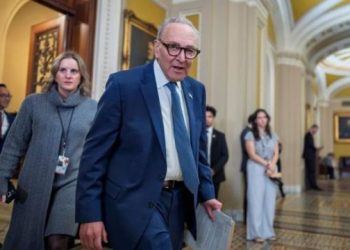Breathtaking: There’s no other word for the sheer ambition and scope of President Donald Trump’s second inaugural address. Trump is back, exuding the confidence of a man delivered from the brink for a purpose.
Voters salvaged his political career and legacy by reelecting him despite numerous accusations and criminal charges. Trump now has a second chance—granted by God and the country—and his address left no doubt about his plans to transform America.
“The future is ours, and our golden age has just begun,” he declared.
Other presidents have spoken optimistically, but Trump presented an agenda more ambitious than any since the New Deal. His words may well redraw the lines of power in Washington.
John F. Kennedy promised the moon; Trump has set his sights on Mars, pledging to “plant the stars and stripes on the planet Mars.” He stayed true to his campaign promises, showing no hesitation in pursuing bold policy changes.
Trump addressed the immigration crisis with his characteristic resolve, citing legislation from 1798 to justify actions against foreign gangs and criminal organizations. He announced that cartels smuggling drugs and people across U.S. borders will now be designated as terrorist organizations.
He also called for redefining birthright citizenship to ensure children of illegal immigrants are no longer automatically granted American citizenship.
Trump reiterated his concern about Panama’s management of the Canal, accusing the country of overcharging U.S. ships and allowing China undue influence over this strategic waterway.
Despite his firm stances, Trump struck a conciliatory tone, proclaiming, “My proudest legacy will be that of a peacemaker and a unifier.”
His military plans include removing “radical political theories” and “social experiments” from the armed forces, reinstating—with back pay—those expelled for refusing the COVID vaccine, and focusing the military on its core mission of defeating America’s enemies.
Diplomacy was equally emphasized. Trump stated, “We will measure our success not only by the battles we win, but also by the wars we end, and perhaps most importantly the wars we never get into.”
In a move to restructure U.S. revenue collection, Trump proposed an “External Revenue Service” to collect tariffs, declaring, “Instead of taxing our citizens to enrich other countries, we will tariff and tax other countries to enrich our citizens.”
Trump took direct aim at progressive ideologies like diversity, equity, and inclusion (DEI), which he sees as hallmarks of identity politics. He views the election as a mandate to protect women’s spaces from “biological males.” His executive orders will define sex strictly as male or female in government documents and spaces.
Without explicitly mentioning “affirmative action,” Trump signaled his intention to dismantle systems of racial preferences central to identity politics.
Unlike in 2017, Trump seems unwilling to wait for Congress to define his priorities, emboldened by lessons from his first term. His agenda is clear and bold, though its implementation will undoubtedly face court battles and political resistance.
Some questions remain: Can Trump push this agenda forward with a narrowly Republican-controlled House and Senate? The answers will determine how far this vision can go.
This was a speech from a man willing to dare everything—just what his supporters hope for and what his critics most fear.
 Telegram is where we really talk. Don't miss out!
Telegram is where we really talk. Don't miss out!








